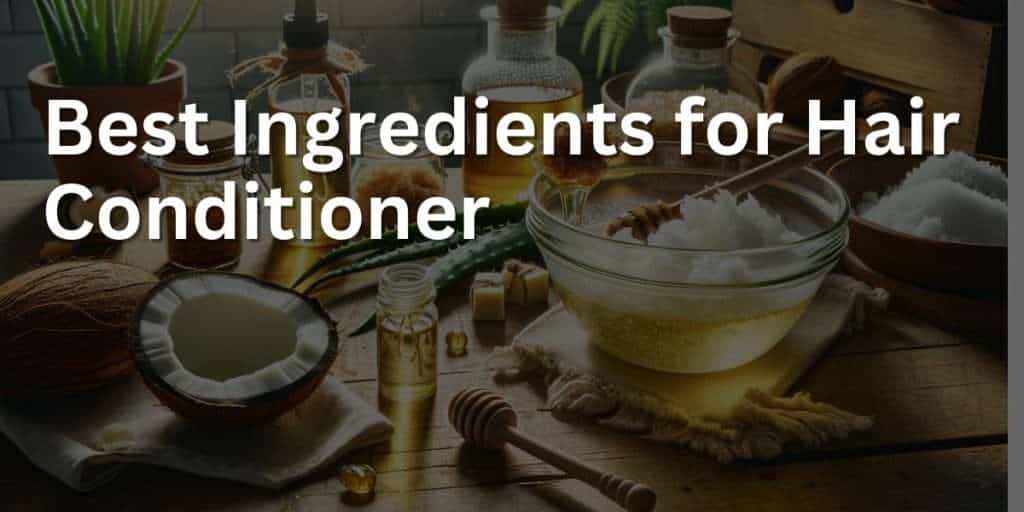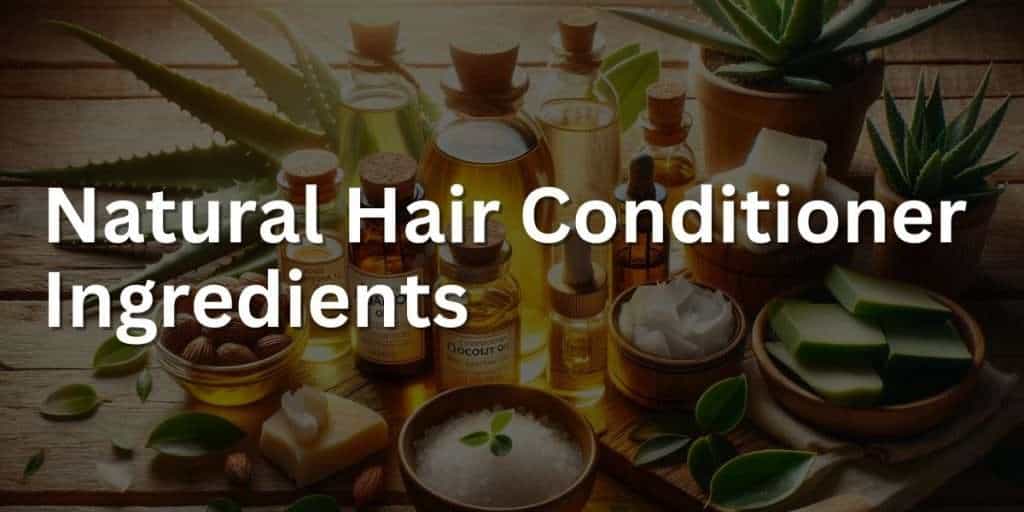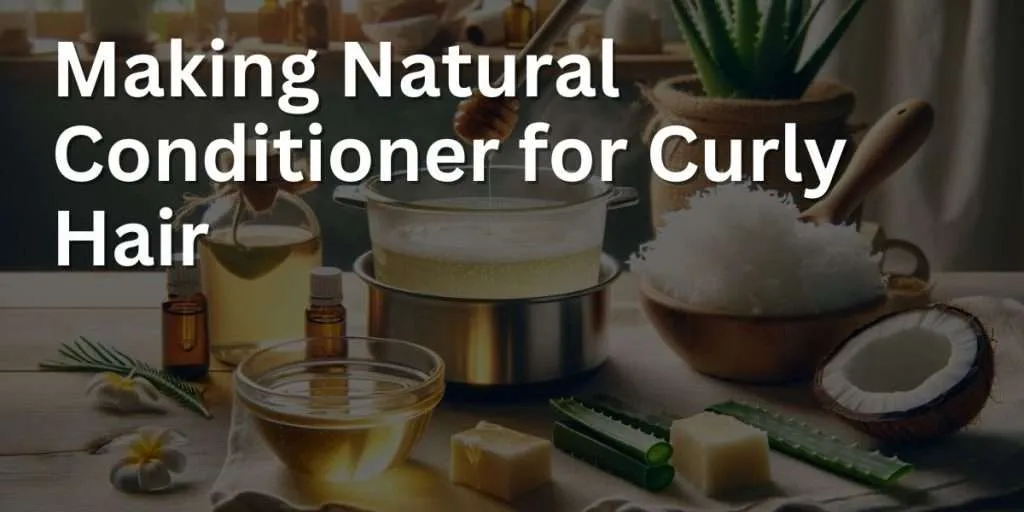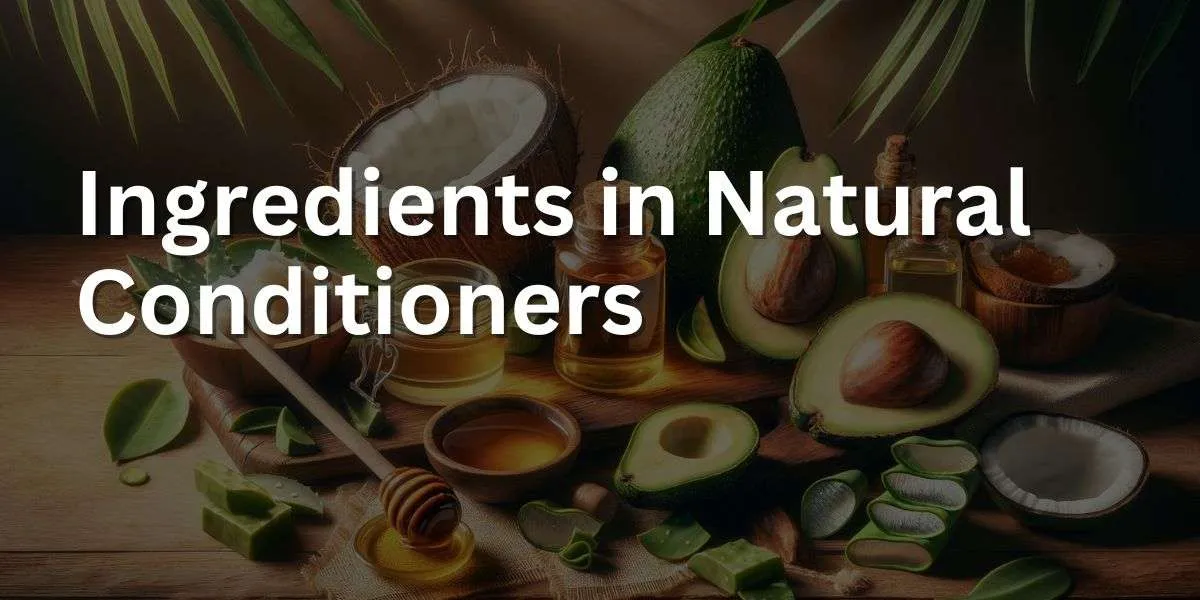When it comes to ingredients in natural conditioners, there’s a verdant garden of options that promise to leave your hair soft, manageable, and healthy.
This post will serve as your field guide through the lush landscape of natural hair care. Whether you’re a seasoned naturalista or just dipping your toes into the world of eco-conscious beauty, understanding what goes into your conditioner is as important as the results it delivers.
From nourishing oils to herbal extracts, we’ll unpack the most common ingredients you’ll find in natural conditioners and their roles in hair health. Plus, I’ll share insights on which ingredients might be best for your specific hair type and needs.
Are you ready to decode the label on your favorite bottle and discover the natural treasures it holds? Let’s explore the bountiful world of natural conditioner ingredients together.
Key Takeaways: Ingredients in Natural Conditioners
Natural oils and butters. Ingredients like coconut oil, shea butter, and argan oil are common in natural conditioners for their deep moisturizing properties.
Plant extracts. Aloe vera, tea tree, and chamomile extracts are often used for their soothing and anti-inflammatory effects on the scalp and hair.
Proteins. Hydrolyzed proteins such as silk, wheat, or quinoa strengthen and repair the hair shaft, improving hair elasticity and reducing breakage.
Essential oils. Essential oils not only add natural fragrance but also can promote a healthy scalp and hair growth (e.g., lavender, peppermint, and rosemary oils).
Vitamins. Vitamins like biotin (B7), panthenol (pro-vitamin B5), and tocopherol (vitamin E) are added to nourish the hair and protect it from environmental stressors.
Herbal infusions. Herbs such as nettle, horsetail, and hibiscus can be infused into natural conditioners for their nutrient-rich benefits.
Natural preservatives. To extend the shelf life of natural conditioners, ingredients like vitamin E, rosemary extract, or grapefruit seed extract are used as natural preservatives.
Acidic components. Natural acids like apple cider vinegar or citric acid help to smooth hair cuticles and balance the pH level of the scalp.
Best Ingredients for Hair Conditioner
The best ingredients for hair conditioner are those that align with the goals of hydration, nourishment, and protection for a wide array of hair types. Natural oils like argan oil, jojoba oil, and coconut oil are celebrated for their deep moisturizing properties. They work by sealing in moisture and adding a protective layer that enhances hair’s natural shine and elasticity.
Proteins such as hydrolyzed keratin or silk protein are also stellar ingredients, fortifying the hair’s structure, repairing damage, and increasing resilience against breakage. These proteins closely mimic the hair’s natural keratin, effectively bonding with the hair to restore its integrity.
Botanical extracts, including aloe vera and green tea, bring a host of benefits due to their vitamins and antioxidants. Aloe vera, in particular, is renowned for its soothing and conditioning properties, while green tea can help support scalp health and hair growth.
Shea butter and cocoa butter are excellent for adding richness to conditioners, offering intense moisture that is particularly beneficial for dry or coarse hair textures. They also provide a sumptuous texture to the conditioner itself, making the application a luxurious experience.
Panthenol, a form of vitamin B5, is a humectant that attracts and retains moisture in the hair, promoting its long-term hydration. It also adds a smoothness that can make detangling a breeze.
These ingredients, when included in hair conditioners, contribute to a powerful blend that can revitalize and maintain healthy, lustrous hair. Opting for conditioners with these components can lead to a noticeable improvement in hair texture, manageability, and overall health.

Natural Oils and Nut Butters for Hair Conditioner
Oils and Nut Butters for Hair Conditioner are a treasure trove of nourishment for your locks, providing a rich source of moisture and essential nutrients. These natural emollients are key to creating a conditioner that not only softens but also strengthens hair from the inside out.
Coconut oil is a favorite for its penetrating abilities, reaching deep into the hair shaft to provide moisture and protection against protein loss. Argan oil, often referred to as ‘liquid gold’, is packed with antioxidants and Vitamin E, which help to give hair a natural boost and a glossy sheen.
Shea butter, extracted from the nuts of the Shea tree, is an exceptional ingredient for conditioners due to its rich fatty acid content. It offers unparalleled moisture and is particularly beneficial for curly and coarse hair types that crave extra hydration.
Jojoba oil’s structure closely resembles the natural sebum produced by the scalp, making it a harmonious match for maintaining scalp health and balancing oil production. It’s also wonderful for adding softness and manageability to hair.
Almond butter and cocoa butter are sumptuous additions that can help to create a thick, creamy conditioner. They envelop each strand in a protective layer that retains moisture and improves elasticity, reducing the likelihood of breakage.
Plant extracts as Hair Conditioner Ingredients
Plant extracts for Hair Conditioner bring the essence of botanical richness to your hair care regimen. These extracts are sourced from nature’s bounty, each with unique properties that cater to various hair needs.
Aloe Vera for Hair Conditioner
Aloe Vera for Hair Conditioner is a fantastic choice for those looking to infuse their hair care routine with a touch of nature’s nurture. Aloe vera, a succulent plant, is rich in vitamins, minerals, and amino acids, which are the building blocks for healthy hair. When used in hair conditioners, aloe vera acts as a moisturizing agent, soothing the scalp and conditioning the hair without weighing it down.
The gel extracted from the aloe vera leaf is known for its hydrating properties, making it ideal for locking in moisture and preventing dryness. Its natural enzymes can help rejuvenate the hair, promoting a healthy scalp environment that is conducive to hair growth.
Aloe vera’s natural vitamins, including A, C, and E, contribute to cell turnover and shine, giving your hair a vibrant and healthy appearance. The presence of vitamin B12 and folic acid in aloe vera is also beneficial in preventing hair fall.
Incorporating aloe vera into a hair conditioner can help to detangle and smooth hair, making it a friend to those with frizzy or curly tresses. Its lightweight nature makes it suitable for all hair types, from thin to thick, without the risk of buildup.
Green tea extract is loaded with antioxidants that protect the hair and scalp from environmental stressors. Its catechins help to reduce dihydrotestosterone (DHT), which is responsible for hair loss, making it a valuable ingredient for those concerned with hair thinning.
Chamomile extract is renowned for its calming effects, not just on the mind but also on the hair and scalp. It can brighten blonde hair naturally and soothe irritated scalps, leaving behind a gentle fragrance and a soothing sensation.
Rosemary extract stimulates the scalp, improving blood circulation, which is essential for nourishing hair follicles and promoting hair growth. Its antiseptic properties also help in preventing scalp issues like dandruff.
Lavender extract is another gem, known for its ability to balance scalp oils and promote a sense of calm. Its regenerative properties can help in dealing with issues like hair breakage and alopecia.
Proteins for Hair Conditioner
Proteins for Hair Conditioner are integral to fortifying hair, repairing damage, and enhancing texture. These proteins bond with the hair cuticle, replenishing areas that have been eroded by environmental stress, heat styling, and chemical treatments.
Hydrolyzed keratin, a protein naturally found in hair, is a popular ingredient that helps to rebuild the hair’s natural protective layer, restoring strength and elasticity. It effectively reduces breakage and split ends, leading to a smoother hair surface that reflects light for added shine.
Silk proteins, derived from the strong fibrous threads of the silk cocoon, are celebrated for their ability to penetrate deep into the hair shaft, providing moisture and promoting hair growth. Their film-forming properties help in retaining moisture and imparting a silky, glossy finish to the hair.
Wheat protein is another excellent choice for hair conditioners, offering a balance of moisture retention and volume. It’s particularly beneficial for fine or limp hair, providing body and fullness without heaviness.
Rice protein is rich in amino acids, which strengthen hair fibers, increase hair volume, and add natural luster. It’s a gentle protein, making it suitable for even the most sensitive scalps and delicate hair types.
Essential oils as Hair Conditioner Ingredients
Essential oils as Hair Conditioner Ingredients serve as a natural and aromatic way to enhance the health and vitality of your hair. These concentrated botanical oils are revered for their therapeutic properties and potent actives that cater to a spectrum of hair care needs.
Peppermint oil invigorates the scalp with a cooling sensation, promoting blood circulation that can lead to improved hair growth. Its refreshing scent adds an invigorating note to the conditioning experience.
Lavender oil is cherished for its ability to soothe the scalp and reduce stress, which is often a contributor to hair issues. It also balances sebum production, making it a versatile addition for both dry and oily hair types.
Tea tree oil is a powerhouse with antimicrobial properties, making it an excellent choice for combating dandruff and maintaining a clean, healthy scalp environment.
Rosemary oil is another essential oil that stimulates the roots, improves hair growth, and increases circulation in the scalp. It’s also known for its ability to deepen hair color, adding vibrancy to darker shades.
Ylang-ylang oil, with its luxurious floral scent, is a natural conditioner that can improve hair texture and reduce breakage. It’s especially beneficial for brittle, thinning hair, providing a strengthening effect.

Vitamins as Hair Conditioner Ingredients
Vitamins as Hair Conditioner Ingredients are essential for maintaining the health and vitality of your hair. They act as catalysts for many biological processes, including hair growth and repair.
Vitamin E is a powerful antioxidant that helps to protect the hair from oxidative stress caused by free radicals. It also provides deep nourishment to the hair follicles, promoting a healthy scalp and resulting in shiny, well-conditioned hair.
Biotin, or Vitamin B7, is well-known for its role in hair health. It strengthens the hair shaft and supports the production of keratin, which can lead to fuller, thicker hair.
Niacin, or Vitamin B3, enhances the appearance and feel of hair, by improving its elasticity, enhancing its barrier function, and reviving its overall health.
Pantothenic acid, or Vitamin B5, binds to the hair, sealing in moisture and adding a natural luster. It’s also known for its ability to rebuild individual hair shafts, reducing hair loss and improving hair texture.
Vitamin A has a crucial role in cell growth, including hair cells. It helps in the production of sebum, which moisturizes the scalp and keeps hair healthy.
D Panthenol for Hair Conditioner
Panthenol is a compound used to add lustre and shine to hair. It’s an active ingredient that penetrates deep into the cuticle of your strands, which means you’ll see results after one or two uses!
Panthenol is a form of vitamin B5 that can be found naturally in most living organisms. This ingredient has the ability to moisturize and strengthen hair, making it healthier from root to tip.
Herbal Extracts as Hair Conditioner Ingredients
Herbal Extracts as Hair Conditioner Ingredients infuse your hair care routine with the wisdom of traditional herbal remedies, harnessing the power of nature to nourish and revitalize your hair.
Ginseng extract is renowned for its stimulating properties, which can promote hair growth by enhancing blood flow to the scalp. It’s a revered tonic that strengthens the hair roots and increases the vitality of hair strands.
Horsetail extract, rich in silica, can improve hair growth and strength. Silica is known to fortify the hair cuticles, resulting in a smoother hair surface and a reduction in brittleness.
Nettle extract is a nutrient-rich herb that can reduce inflammation on the scalp and combat hair loss. It’s also believed to restore hair color and texture, making it a prized ingredient for those with thinning hair.
Rosemary extract is not just a culinary delight but a hair care staple as well. It’s associated with stimulating hair growth and is often used to treat dandruff and dry scalp conditions.
Calendula extract, with its soothing properties, is ideal for calming an irritated scalp. It can also enhance hair color, adding highlights to lighter hair tones.
How to Choose The Right Natural Conditioner for You
Choosing the Right Natural Conditioner for Your Hair Type is a personalized journey to finding the perfect match that caters to the unique needs of your hair. It’s about understanding the characteristics of your hair and selecting a conditioner that complements its texture, porosity, and overall condition.
Natural Conditioner For Normal Hair
A Natural Conditioner for Normal Hair is a delightful blend that maintains the natural equilibrium of your hair, providing just the right amount of nourishment without overburdening it.
Honey, a natural humectant, is the star of this recipe. It draws moisture into the hair and retains it, ensuring that each strand is optimally hydrated. Its natural antioxidant properties also contribute to keeping the scalp and hair healthy.
Jojoba oil complements honey beautifully by mimicking the natural oils of the scalp, promoting a balanced environment without causing excess oiliness. It’s perfect for normal hair as it conditions without altering the hair’s natural harmony.
To this, add a splash of rosewater, which not only imparts a luxurious scent but also conditions the hair, leaving it soft and replenished. Its gentle nature makes it suitable for everyday use.
For a touch of vitality, infuse the mixture with a few drops of lavender essential oil. Lavender is known for its soothing properties and can help to maintain a calm and healthy scalp.
To prepare this conditioner, whisk together a tablespoon of honey and jojoba oil each, ensuring they are well combined. Stir in a quarter cup of rosewater and then add the lavender oil, adjusting the quantity based on your preference for fragrance.
After shampooing, apply this natural conditioner to damp hair, distributing it evenly from the mid-lengths to the ends. Allow it to sit for a couple of minutes to work its magic, then rinse out thoroughly.
Natural Conditioner For Oily Hair
For those with fine or oily hair, lightweight conditioners with aloe vera or tea tree oil can provide hydration without weighing hair down. These ingredients maintain the delicate balance needed to keep hair buoyant and scalp health in check.
A Natural Conditioner for Oily Hair is a thoughtful concoction designed to balance the scalp’s natural oils without stripping away moisture. This recipe harnesses the astringent and clarifying properties of natural ingredients to leave hair feeling refreshed and light.
Apple cider vinegar is a key component, celebrated for its ability to balance the scalp’s pH and cut through oiliness. It acts as a natural detangler and adds shine to the hair.
Combine this with green tea, which is rich in antioxidants and has been shown to reduce the production of excess sebum on the scalp. Its stimulating properties also promote healthy hair growth.
Aloe vera gel is included for its gentle hydrating qualities. It moisturizes the hair without leaving a heavy residue, making it perfect for oily hair types.
Essential oils such as lemon or peppermint can be added for their cleansing and refreshing effects. Lemon oil helps to remove excess oils and contributes a clean, citrus scent, while peppermint oil invigorates the scalp and encourages circulation.
To create the conditioner, mix the apple cider vinegar and brewed green tea in equal parts. Then, blend in aloe vera gel to achieve a light, serum-like consistency. Add a few drops of the chosen essential oils for their additional benefits and fragrance.
Apply this natural conditioner to the mid-lengths and ends of the hair after shampooing, avoiding the roots to prevent additional oiliness. Rinse thoroughly with cool water to seal the hair cuticles and enhance shine.

Natural Conditioner For Curly Hair
Individuals with curly or coarse hair might look for conditioners rich in shea butter or coconut oil. These ingredients deliver intense moisture and help to tame frizz, defining curls and making them more manageable.
A Natural Conditioner Recipe for Curly Hair is a lovingly crafted potion, designed to enhance the natural beauty of curls with deep hydration and definition.
Shea butter is the cornerstone of this recipe, revered for its rich moisturizing properties that are particularly beneficial for the often dry, curly hair types. It helps to reduce frizz and adds a creamy texture to the conditioner.
Coconut oil is another hero ingredient, penetrating the hair shaft to provide moisture and promote scalp health. Its ability to reduce protein loss in hair makes it a vital component for curls that need strength and elasticity.
Aloe vera gel is included for its lightweight moisturizing benefits, ensuring that curls are nourished without being weighed down. It also contributes to the conditioner’s soothing feel on the scalp.
For enhanced curl definition and scalp health, add honey, which acts as a natural humectant, drawing moisture into the hair and offering a slight hold to help define curls.
To infuse the conditioner with a pleasant aroma and additional therapeutic properties, incorporate essential oils like ylang-ylang or geranium. These oils can help balance the scalp’s oil production and enhance the natural luster of curly hair.
To create this conditioner, melt shea butter and coconut oil in equal parts in a double boiler. Once liquefied, remove from heat and stir in aloe vera gel and honey. As the mixture begins to cool and thicken, add a few drops of your chosen essential oils.
Apply this rich, natural conditioner to wet hair after shampooing, focusing on the ends where curls tend to be the driest. Detangle gently with your fingers or a wide-tooth comb, then rinse with cool water to help seal the hair cuticles and boost shine.
Natural Conditioner For Colored Hair
Those with color-treated hair can benefit from conditioners infused with chamomile or green tea extracts, which are gentle on the hair and help to preserve color vibrancy while providing soothing scalp care.
A Natural Conditioner Recipe for Colored Hair is a thoughtful formulation that aims to protect and prolong the vibrancy of dyed strands while nourishing the hair.
The base of this conditioner is avocado oil, which is full of fatty acids and vitamins that are excellent for maintaining the health of colored hair. It helps to lock in color and prevent fading while providing essential nutrients to the hair.
To this, add apple cider vinegar, which works wonders in sealing hair cuticles. This not only helps to keep the color from washing out but also enhances shine and smoothness.
Aloe vera gel is a gentle hydrator that won’t strip color from the hair. It contributes to the conditioner’s ability to moisturize and soothe the scalp without affecting the dye.
For an extra boost of color protection, include sunflower seed extract, which is known for its natural ability to shield hair from UV rays that can cause color to fade.
Essential oils like chamomile or lavender can be added not just for their calming scent but also for their scalp-calming properties. Chamomile, in particular, can add brightness to blonde hues, while lavender is gentle enough for all hair colors.
To prepare this conditioner, whisk together equal parts of avocado oil and aloe vera gel. Stir in a tablespoon of apple cider vinegar to the mixture. Add a teaspoon of sunflower seed extract, then finish with a few drops of your chosen essential oils.
After shampooing, apply this natural conditioner to damp hair, taking care to cover each strand for maximum protection. Leave it on for a few minutes to allow the ingredients to penetrate and work their magic, then rinse thoroughly.
Natural Conditioner Recipe For Dry Hair
For hair that is dry or damaged, conditioners packed with proteins like keratin or plant-based alternatives can help to repair and rebuild hair structure, restoring its strength and elasticity.
A Natural Conditioner for Dry Hair can be a game-changer for those seeking to infuse their locks with moisture and life. This recipe is a blend of nature’s most hydrating elements, tailored to quench the thirst of parched strands.
Begin with a base of coconut oil, celebrated for its deep moisturizing properties and ability to penetrate the hair shaft. Combine this with shea butter, a rich source of fatty acids and vitamins, to provide a luxurious and intensive conditioning treatment.
To this mixture, add aloe vera gel, a lightweight hydrator known for its soothing and healing properties. It helps to lock in moisture without adding heaviness to the hair.
Incorporate a few drops of argan oil, which is rich in antioxidants and Vitamin E. This ‘liquid gold’ is renowned for making hair soft, silky, and shiny.
For a fragrant touch and additional benefits, include essential oils like lavender or sandalwood. Lavender oil can help to calm the scalp and reduce flakiness, while sandalwood oil can add a lustrous sheen to the hair.
Blend these ingredients until you achieve a smooth consistency. Apply the conditioner to clean, damp hair, focusing on the ends where dryness is most prevalent. Leave it on for a few minutes to allow the hair to absorb the nutrients, then rinse thoroughly.
Common Misconceptions About Natural Conditioners
Common Misconceptions About Natural Conditioners often stem from a lack of information or preconceived notions about their efficacy and benefits. Dispelling these myths is key to understanding and appreciating the value they bring to hair care.
One prevalent misconception is that natural conditioners lack the power to properly moisturize hair, especially when compared to their synthetic counterparts. However, natural conditioners are abundant in rich, nourishing ingredients like jojoba oil, coconut oil, and shea butter, which are highly effective at hydrating and repairing hair.
Another myth is that natural conditioners don’t produce the same smoothing and detangling effects as traditional ones. Yet, ingredients like marshmallow root extract and slippery elm are known for their natural slip, which helps in detangling and smoothing out hair strands.
There’s also a belief that natural conditioners won’t leave your hair looking as shiny. On the contrary, natural conditioners often contain botanical oils and herbal extracts that can enhance hair’s natural sheen and luster.
Some might think that natural conditioners are not as potent and therefore cannot address specific hair issues like dandruff or scalp irritation. In fact, many natural conditioners include tea tree oil, neem, or willow bark extract, which are powerful at tackling these concerns due to their inherent antifungal and antibacterial properties.





